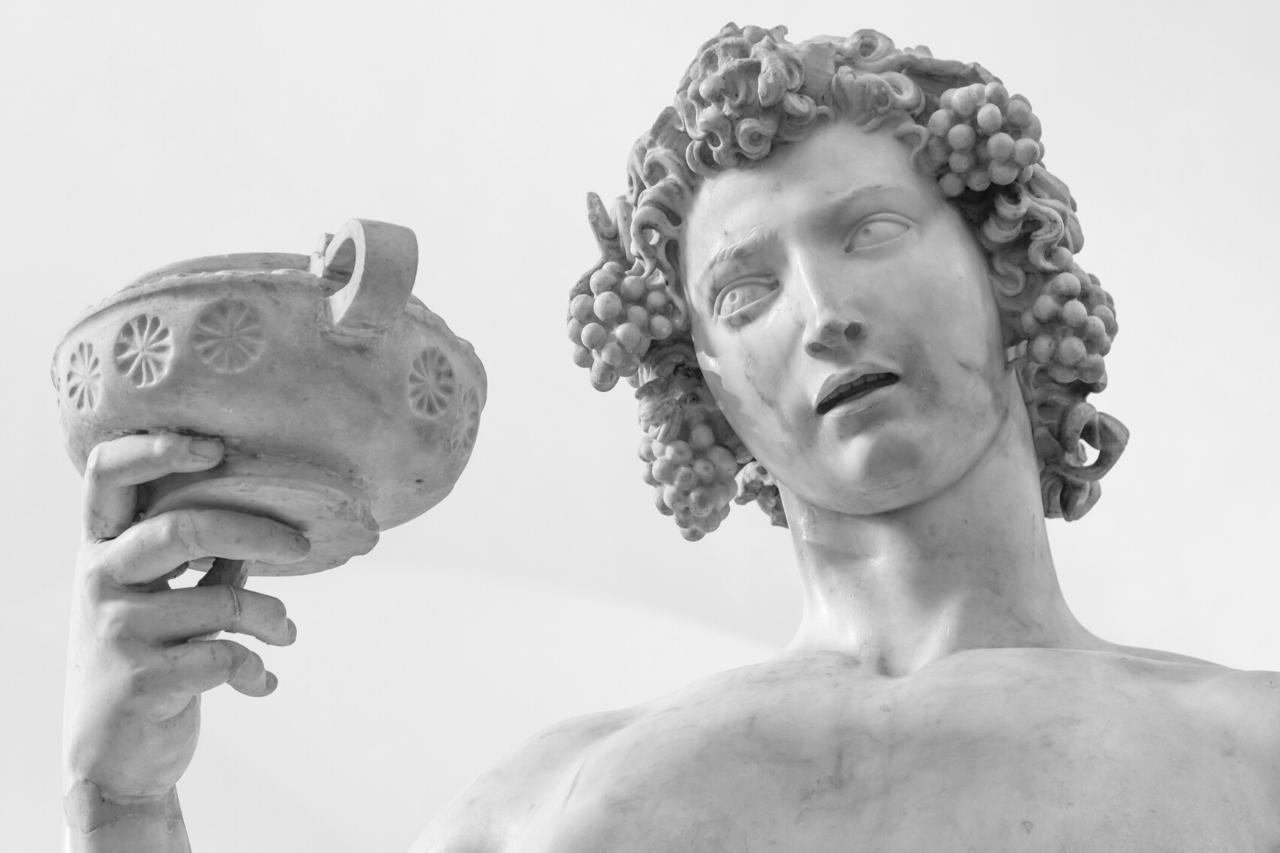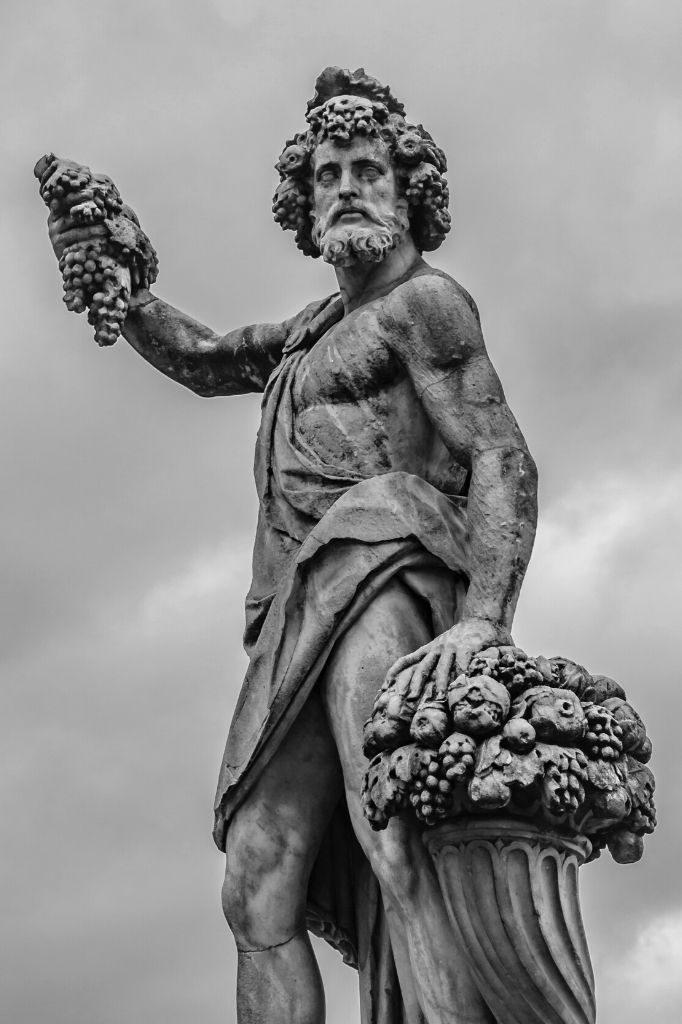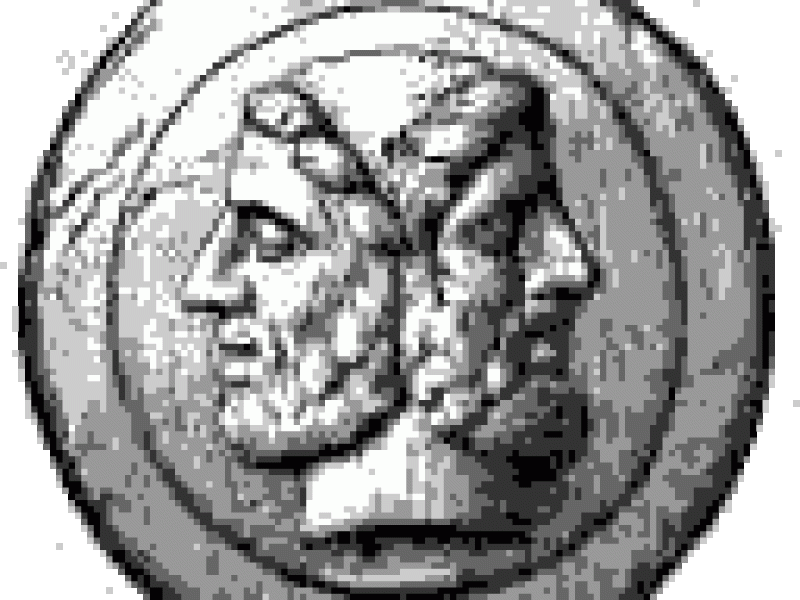Bacchus
Bacchus: The Roman god of wine and viticulture
Bacchus was the Roman god of wine, wine-making, and drunkenness.
His Greek equivalent was Dionysus, and he was seen as the “party god.” He could induce states of wild creativity as well as religious fervor.
This article will describe how Bacchus turned into something akin to a “frat boy.”
Who Is Bacchus in Roman Mythology?
Bacchus was the combination of the Greek god Dionysus and the wine god, Liber, whose name means ‘free.’ Bacchus’ Latin name came from the Greek word Bakkhos, which was also one of the names for Dionysus. This word came from another Greek word, “bakkheia.” It describes the frenzied, wild state of ecstasy that this particular god could bring about in people.
Bacchus and Dionysus were very similar. While Bacchus was the Roman version of Dionysus, they remained their own gods in their own rights. They were each the gods of wine and pleasures, but their stories were sometimes different. Both Dionysus and Bacchus were known for their frenzy and revelry.
While the Romans made Bacchus a god, many were concerned about the dangerous excess this god celebrated. They thought his cult following was indecent.
He was also the god of sexual freedom, the grapevine harvest, fertility, and wild things. Wine was an important part of Greek/Roman culture, so Bacchus held a high place in Roman mythology.
How Was Bacchus Born?
Oddly, Bacchus was said to have been born “twice.” In one birth, he was born of Zeus and Prosperina (Persephone). Proserpina was the daughter of the goddess Ceres, who was one of Zeus’ siblings. In the other birth, he was reborn of Jupiter and a mortal woman named Semele.
According to myth, there were two who could hold the place as the mother of Bacchus.
Jupiter and Proserpina
Proserpina was taken one day by Pluto, god of the underworld, and she became his wife. She stayed half the year under the earth along with her husband.
Since she lived beneath the world, Jupiter turned himself into a serpent and went to seduce her. Proserpina conceived and gave birth to a child, Bacchus.
In the earlier telling of this tale, his name might have been Liber but later changed to Bacchus. How strange that the god of wine and revelry was born in such a cold and awful place as the underworld!
Jupiter and Semele
The other story is a little stranger and more tragic. Bacchus was already born, as the son of Jupiter and Prosperina. He was one of the early gods who helped in the battle against the Titans.
Saturn was already dead, but there remained those who were still loyal to him. Jupiter, his siblings, and Bacchus fought against the Titans. Bacchus was killed by being torn to pieces.
Sad about his son’s death, Jupiter took the pieces and put them into a drink. He gave the drink to a mortal woman named Semele. He asked her to drink it so that she could become pregnant and give birth to Bacchus once more. She agreed, but Juno, Jupiter’s wife, was angry about this.
She disguised herself as a nurse and went to visit the pregnant Semele. She told Semele to ask Jupiter to come and sleep with her as he did with his wife.
Semele agreed, but when she asked Jupiter for this, he killed her with a lightning bolt. He took the now reborn Bacchus with him. It’s unclear whether he killed her because it was an insult to the gods to ask for sex, or if he wanted to avoid any problems with his wife.
Ovid’s Variation
There was an added twist to this story, as there often is. Jupiter didn’t kill Semele with a lightning bolt because she asked him to sleep with her. She died because she was too weak and feeble to engage in lovemaking with a god. So he took Bacchus with him, but he was still not fully grown.
Zeus tied his son to his thigh so that he could feed upon him until he was ready to be birthed. Once he was, Zeus put him on Mt. Nysa among nymphs so that he could be cared for there.
The Bacchus Story: Tales of the Drunken God
The god of wine certainly had to have a whole list of tales, hadn't he?
However, there aren’t too many Bacchus myths. He was seen as a dangerous, excessive god who might lure people into fits of frenzy, lacking in control.
Despite being a god, there were many who didn’t think he was safe to celebrate.
It was his cult following and the Bacchus festivals that really got the attention. Bacchus came into the Roman religion around the 3rd century BC, and he sort of replaced Dionysus.
Or rather, he was inspired by him. The people began to celebrate and worship him, resulting in wild festivals.
Bacchus and Bacchanalia
Bacchanalia was the thing that Bacchus was most known for. Even today, people still talk about a drunken, wild party as a Bacchanalia, in reference to this Roman god. These festivals were very similar to those thrown in Dionysus’ honor. They would happen several times a year, mainly in the countryside.
These festivals would include the pulling apart of live animals. People would eat the raw flesh, meant to symbolize what Bacchus went through in being reborn. It was a religious ritual, and the people hoped to bring a part of the god inside them and become one with him.
In later years, it became a little more focused on wine, revelry, and sexuality. People who drank and engaged in sexual free-for-alls were also part of these rituals.
The Bacchus Cult and the Bacchic Mysteries
Bacchus’ cult drew from the original cults of Liber and Dionysus. Liber (later Dionysus/Bacchus) became part of the Aventine Triad, which included Ceres and Liber’s sister, Liberia. Liber and Libera later became Bacchus and Proserpina in Roman minds.
Not only was Bacchus known for his wild party-making or for being the patron of wine. He was also almost an agriculture god, with his connection to viticulture and the grapevine.
Some stories stated that Bacchus traveled around, educating the people on how to grow grapes. Those who worshipped Bacchus would engage in drunken festivals like the Bacchic Mysteries.
In these, the participants would drink, not just to party, but to reach a state of fervor and ecstasy. In these states, they would move beyond social bounds and inhibitions. It was done to bring the people to their natural state.
Control of the God of Drunkenness
There were some in government during Roman times who didn’t like the hold that Bacchus had on the people. They certainly disapproved of the Bacchanalia.
Men like Livy and Cicero believed these rituals to be dangerous and indecent. While the Bacchanalia had originally begun amongst the common folk, it soon made its way to Rome’s elite.
That was when the higher-ups got worried. They thought that it would tarnish those of more respectable birth, and they wanted to put a stop to it. Like other times in history, there was a bit of a panic about morality. So these powerful men put various bans on the rituals that affected the people’s ability to engage in it, in its full form.
The festivals now needed permission from the senate and were limited to only three people. It was also deemed illegal to use property to celebrate the festival. Those who did so against the rules were taken and executed.
Over 7,000 people were arrested for not following the law. Later, Bacchus’ festivals were combined with Liber’s to make things slightly more respectable.
Bacchus vs. Dionysus
As time went on, the differences between these two gods grew as well as the people’s perception of them. People saw Dionysus perhaps as more linked to religion and religious rituals. He was the god in search of spiritual understanding along with the breaking of barriers.
On the other hand, Bacchus turned into a drunken, thoughtless god who encouraged sexual freedom.
Dionysus might have been a little more respected and sophisticated. He used wine to open the window between man and god and to loosen the constraints on society. Bacchus used wine to engage in hedonistic pleasures for their own sake.
Now, this wasn’t totally accurate, since the records are spotty about Bacchus in general. He didn’t appear in as many stories as Dionysus did. Basically, Bacchus was more of a wild partygoer, and Dionysus, more like a sommelier.
Bacchus' Symbol In Artwork
In earlier times, Bacchus was portrayed as a middle-aged man with a beard. He was covered in a robe.
Later, he was shown as a younger man, sometimes even androgynous without facial hair. He would be surrounded by ivy and grapevines, showcasing his god-like power over the growth of these plants.
He sometimes carried a staff and would often hold a cup of wine or would already appear drunk. Instead of like his clothed predecessor, he was often shown half or fully naked as the perspective of this god changed over time. From middle-aged alcoholic to young, attractive frat boy, perhaps?
Bacchus in Pop Culture
Bacchus has sometimes appeared as a character in books or TV shows such as “The Magicians.” He is often represented as a drunken, wild character but sometimes not even named. We’ve seen symbols and representations of Bacchus in various media. He’s a character we know well and one we’ve seen time and time again.
After Roman times, Bacchus appeared in many texts, not limited to poems by Longfellow and Milton. He is also remembered for the wild parties that were thrown in his honor in Rome. Today, if you host a wild party with wine and merriment, you could definitely think of yourself as hosting a Bacchanalia.
Conclusion
Bacchus was an interesting part of Roman mythology. He is one of the examples of a god that might have been feared as well as revered. Let’s take a look at the overall points about Bacchus:
Bacchus was the Roman god of drunkenness, wine, grapevine, and viticulture
He was very similar to the Greek god Dionysus and was inspired by him
His name comes from the word, bakkheia, which is the wild, frenzied state of ecstasy this god could bring about through the use of alcohol
Dionysus might have been seen as more respected and sophisticated. Bacchus later became the god of all things excessive (more of a party-focused god)
He was born ‘twice’
In one birth, his father was Jupiter and his mother was Proserpina, the woman who was taken by Pluto
After Bacchus died in a battle against the Titans, Jupiter took the pieces of his body, put them into a potion, and gave them to a mortal woman named Semele. He wanted her to drink it and become pregnant with Bacchus to rebirth him
Bacchus, like Dionysus, was celebrated in festivals and rituals in which people got drunk to lower their inhibitions and break boundaries
The Bacchanalia earned a reputation for getting quite wild, not focused on religion but more on revelry and sex
The Roman government tried to put bans on this festival once the elite got involved in its festivities
Bacchanalia is still used today to describe a drunken, wild party
It’s not entirely surprising that one of Jupiter’s sons out of wedlock would end up becoming a sort of a party god. But it’s a little sad that he didn’t get as much recognition as Dionysus. His image became slightly tarnished by the people who took his festivals to a new level, partying harder than ever before. This caused even the government to get involved.
Yet he had a good message, and he wanted the people to throw their cares away and enjoy a good time. We think even today, a lot of us can get behind that mentality. Cheers!









